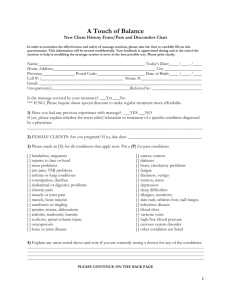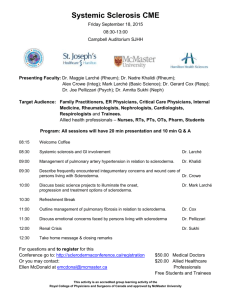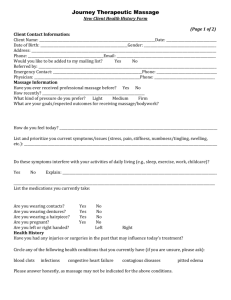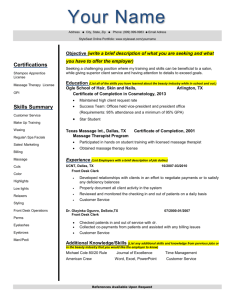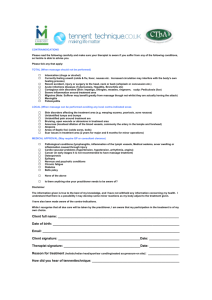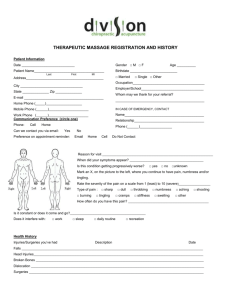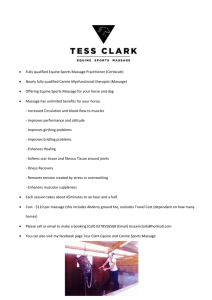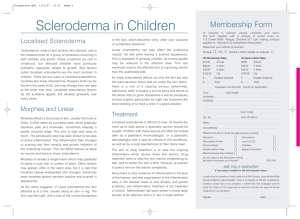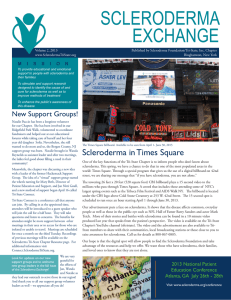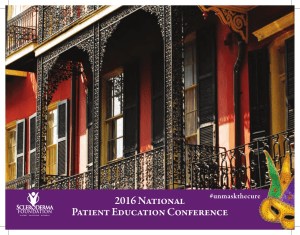View presentation by Dr. Deb Kegelmeyer here
advertisement
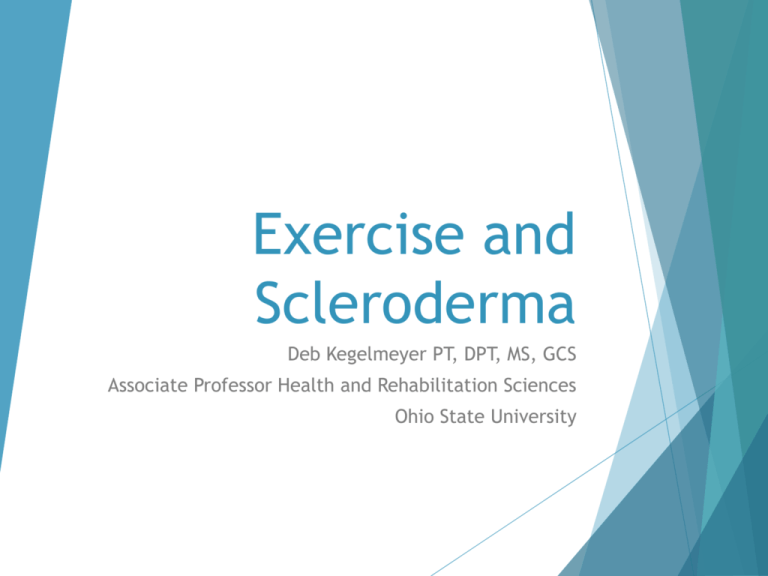
Exercise and Scleroderma Deb Kegelmeyer PT, DPT, MS, GCS Associate Professor Health and Rehabilitation Sciences Ohio State University Exercise, Activity and Scleroderma Exercise is important for health and well being for everyone Individuals with health conditions such as scleroderma can be at increased risk of health conditions such as heart disease, obesity and diabetes if they do not remain active. Inactivity also leads to loss of function and loss of independence Exercise is safe for those with scleroderma if modified based on your own individual strengths and weaknesses Being active improves: Range of motion of the joints Ability to walk Ability to get in and out of chairs, cars, bed and bathtubs Stiffness and decreases pain Endurance Sleep Eating and bowel and bladder function mood What about pain and stiffness? Pain and stiffness can make exercise and daily activity difficult There are ways to decrease pain and stiffness before and during exercise Heat Water massage Wax or Paraffin Baths Application of wax to the hands and feet has been found to be beneficial by some patients. Attention to the temperature of the wax is vital. The oils in the wax and the warmth serve as a useful preparation for exercise. Wax can be applied daily and can be used with care in the home. The Effect of Paraffin and Exercise on Hand Function in Persons with Scleroderma:A Series of Single Case Studies. J HAND THER. 2009;22:71e78. The use of heat can assist in preparing muscles for exercise and is a modality much favored by patients with scleroderma. Hot water bottles and electrically heated pads are useful. However, a hot bath or shower is also beneficial. Hydrotherapy (water therapy) is recommended. Some patients find the temperature of pool water is cool and can lead to an attack of Raynaud’s. If a pool of suitable temperature is available, swimming and exercise in water may help to preserve range of motion, as well as preventing decrease in lung volume. Look for a pool that advertises water therapy for arthritis. You should watch for fatigue and all activities must be tailored to your exercise tolerance. Massage People find massage soothing and some therapists may use aromatherapy oils to assist. Massage of the skin will help to mobilize stiff tissue as well as having a beneficial effect on the circulation and nutrition of the skin. Self Massage Teaching patients to massage themselves helps to increase independence and control. Face and hand massage are good for decreasing pain and improving tissue mobility Alternatively a partner could assist. Hand: https://www.youtube.com/watch?v=6wUWDlfSQN8 Face: https://www.youtube.com/watch?v=V4ANcs7oh9s Exercises, stretches and massage for hands, face and feet are essential. Several studies showed that a combination of exercise and massage improved function in the Face Hands Stretching was included as a part of all exercise programs to maintain flexibility For the face stretching and active exercise are the same exercises For hands stretching should be augmented by squeezing putty or a ball to improve both mobility and strength. All joints and muscle groups should be incorporated. https://ahc.aurorahealthcare.org/fywb/X18006.pdf Exercise for the lungs and the respiratory muscles should also be taught concentrating on lung expansion. Incentive Spirometer Available at www.amazon.com Breathing exercises Use incentive inspirometer 10 deep breaths, slowly exhale Practice blowing as though trying to blow out a lot of birthday candles all at once. Can use a feather or piece of paper to blow on, try to make it move. Or try to make a light weight object move across a table by blowing on it. Stretches to maintain and improve flexibility of the chest are necessary for adequate breathing Aerobic activities to induce deeper breathing could be suggested, e.g. swimming and walking. Aerobics Some individuals with Scleroderma also develop pulmonary hypertension. If you have difficulty exercising, get short of breath easily or have had a change in your ability to exercise you should see your physician before starting or changing your exercise routine. There are few studies but there is some indication that individuals with pulmonary hypertension and scleroderma can tolerate a program of exercise using a stationary bike 45 minutes 3 times a week. Good sample exercise program http://www.move.va.gov/docs/NewHandouts/PhysicalA ctivity/P33_SampleFlexibilityProgramForBeginners.pdf Referral to an occupational therapist may be appropriate for some patients. Splinting to prevent deformity has never been proven to be useful, but it may be helpful in assisting activities. The occupational therapist can also advise the patient about pacing of activities to preserve energy and any adaptations and gadgets to preserve independence. Digisplint

